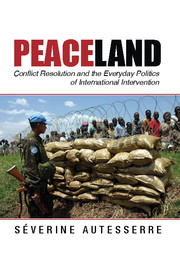2 - The Politics of Knowledge
Published online by Cambridge University Press: 05 July 2014
Summary
In mid-2011, the United Nations (UN) Integrated Office tried to recruit an international consultant to conduct an analysis of conflict dynamics in Congo. The study would serve as a basis for the new UN five-year plan to fight poverty in the country, so it was a high-stakes exercise. The job description for the consultancy enumerated the desired technical skills: a master’s degree in conflict studies or political science, ten years of experience managing peacebuilding programs, knowledge of French, and analytical and synthesis skills. Country expertise was not required. The listing simply stated that “knowledge of the DRC and/or of countries in transition would be a plus.” Needless to say, with only six weeks to complete on-the-ground research and write a fifty-page report on the complex conflict dynamics of a country the size of Western Europe, it would be impossible for someone without preexisting knowledge of the situation to develop an accurate and useful analysis.
Unfortunately, job posts like these are not unique to the UN Integrated Office. They exemplify a pervasive trend in Peaceland. That same year, the European Commission sent out a request for applications to its upcoming election observation mission in Congo. Positions available included “political/country analyst,” “legal analyst,” and “human rights/gender analyst.” The document enumerated a series of criteria for choosing applicants. Candidates did not need specific knowledge of Congo to secure a place on the short list. Country expertise was included in the criteria for final selection, but it was last on the list.
- Type
- Chapter
- Information
- PeacelandConflict Resolution and the Everyday Politics of International Intervention, pp. 68 - 96Publisher: Cambridge University PressPrint publication year: 2014
- 1
- Cited by



